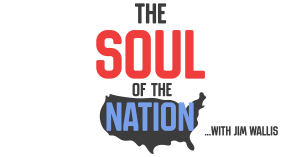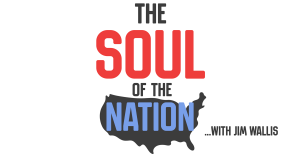
The Soul of the Nation with Jim Wallis
The Soul of the Nation with Jim Wallis informs and inspires everyone from grassroots organizers to political leaders to examine our priorities in meeting the biblical call for social justice and — from that examination — to take action to promote racial and social justice, life and peace, and environmental stewardship.
In the second episode of this new season of The Soul of the Nation, the Rev. Jim Wallis interviews Secretary Julian Castro. Throughout this special season, Wallis will sit down with the 2020 presidential candidates to discuss the intersection of faith and politics. The candidates explain how personal faith has shaped their passion for public service and positive social change.
In the first episode of this new season of The Soul of the Nation, Rev. Jim Wallis interviews Senator Cory Booker. Throughout this special season, Wallis will sit down with the 2020 presidential candidates to discuss the intersection of faith and politics. The candidates explain how personal faith has shaped their passion for public service and positive social change.
This podcast explores the themes in Jim Wallis’ new book Christ in Crisis: Why We Need to Reclaim Jesus.
Are there fundamental truths of Jesus’s ministry that can help us find our way back to him, even and especially amid this fearful moment? Yes, I believe there are and that some of the key questions Jesus asked or provoked would help show us the way forward.
That is what my new book Christ in Crisis: Why We Need to Reclaim Jesus is all about.
Donald Trump’s tweeted and spoken racial assaults on the four members of Congress — Rep. Alexandria Ocasio-Cortez, Rep. Ilhan Omar, Rep. Ayanna Pressley, and Rep. Rashida Tlaib — are a public sin that must be called out.
Removing Trump from power is a task central to the soul of the nation — and to the integrity of faith.
In John 10:10, Jesus says "I am come that they might have life, and that they might have it more abundantly."
In light of Attorney General Barr's egregious testimony before the Senate Judiciary Committee on May 1, we must use a moral lens to see clearly what is happening with our government.
Holy Week for Christians represents a dramatic movement from pain to hope. We deeply feel and lament the pain Jesus Christ endured for us, but we also feel our personal pain and the world’s pain. Then we rejoice as that pain gives way to the eternal hope.
As this conversation continues at the national level, we want to hear from you. What is changing in the way we discuss religion and politics, and what does that tell you about the direction of our country?
The combined forces of white nationalism, white supremacy, and white power pose the greatest terrorist threat now to America’s safety, and the greatest political threat to genuine democracy around the world.
The Reclaiming Jesus elders have called for “national prayer and fasting” to begin on March 6, Ash Wednesday, and to continue throughout the season of Lent.
This year marks the 400th anniversary of the first African slaves sold into human bondage in Jamestown, Va., in August 1619. Although President Trump acknowledged other anniversaries during his State of the Union speech last week —the 75th Anniversary of of the Invasion of Normandy and the 50th Anniversary of the first moon landing — not one word was spoken about the pernicious practice of enslaving our brothers and sisters and its origin in the state of Virginia.
It is time for spiritual preparation for the crisis that is already here — especially for immigrants and people of color. It is a time for prayer and fasting and spiritual vigilance. We must undergird ourselves and our congregations for active and courageous responses — not from the left or the right, but from those who first and foremost are followers of Jesus. Stay tuned.
We are asking every one of you, our readers and partners and allies to pray — in your daily lives and in your churches.
Donald Trump’s wall is obviously a terrible idea: It’s both impractical and ineffective — and more importantly, it’s immoral.
Jesus says, “welcome the stranger." Donald Trump, in great contrast, enacts policies that inflict trauma, pain, danger, and even death on the ones Jesus tells us to welcome. And the evangelical Christian leaders who support Donald Trump have absolutely nothing to say. Ask them this question, “What about Jesus?"
I believe the remembrance of the life of George H. W. Bush last week and going forward give this man one final mission: to demonstrate the values that reveal who genuine leaders are, contrasting the values (or lack thereof) that reveal who are not. What does a leader do or not do? What are the markers of true public service that differentiate it from public exploitation?
As we digest the results of the 2018 midterm elections, there are reasons for people of faith committed to social justice and the common good to be grateful and encouraged. There are also reminders of what we are up against and some real post-election dangers.
Diverse evangelicals, led by people of color and women, want to bring the “good news” back to the gospel of Jesus Christ; in direct contrast to the “bad news” perpetuated by older, white, and partisan evangelical men. Evangelicals are typically identified in the media and by the public as a predominately white, politically right-wing faith group with little to no concern about the poor and oppressed.
Defending systems that just maintain the powerful’s own self-interest while neglecting the interests of others, especially the most vulnerable, is not just bad politics — it’s bad theology.
Survivors have powerful stories and we must listen and believe what they are telling us. The most public of those survivor stories was on display across the country as the nation was riveted to the broadcast and streaming of the Senate hearing and the courageous testimony of of Dr. Christine Blasey Ford.
I observed the funerals of three people recently: John McCain, Aretha Franklin, and Andre Presser. You may know the first two, but I felt such gratitude for a great man like Andre Presser, who wouldn’t be nationally recognized, but will be remembered by countless people as one who helped to shape and change so many lives. May we all live with that as our goal — to inspire and serve those we encounter, regardless of the scale.
In a time when bipartisanship seems like a forgotten dream, it is important for us to find and celebrate cases of lawmakers coming together, regardless of party and ideology, to address the many real and immediate challenges we face as a country.
Make no mistake: Trump has always desired to be a strong man and now he desires to be seen as a strong man as president of the United States. His admiration for autocrats is by no means confined to Vladimir Putin. He has seemed to reserve much of his praise in public and private comments for autocratic leaders like President Erdogan of Turkey and Korean dictator Kim Jong-un, and much of his criticism for allies leading European democracies. He finds the checks and balances of the American system inconvenient, and he clearly wishes that even the modest checks he has had to contend with so far weren't there.
The recently upheld travel ban is motivated by religious animus and racial bigotry: The Muslims being banned by this order are primarily people of color; and their targeting is directly related to the white nationalist ideology that has now taken up office in the White House, which is a great danger to America’s future. The use of religion and race for political purposes undermines the United States’ fundamental commitment to being a pluralist and democratic society.
James 1:27 clearly states "Religion that God our Father accepts as pure and faultless is this: to look after orphans and widows in their distress ..." Yet Attorney General Jeff Sessions perverts the meaning of other biblical verses to justify his horrific treatment of migrant families and migrant children specifically.
On June 14, 350 Christian leaders, who work on the front lines of the battle for The Soul of the Nation, gathered in Washington, D.C., to convene and create an opportunity for building relationships and cross-sector collaboration. Five of those leaders gathered together to lay bare the controversy of what it means to be an evangelical.
Now that several million people have watched the video of Reclaiming Jesus, it is time for us to to take our response to a higher level. Signing the declaration is a good first step but now it is time to action, to answer the call.






